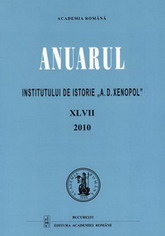Marea Britanie, Franţa şi problema „cordonului sanitar”
Great Britain, France and the Issue of the “Cordon Sanitaire”
Author(s): Bogdan-Alexandru SchiporSubject(s): History
Published by: Editura Academiei Române
Keywords: Great War; peace; cordon sanitaire; Great Britain; French-British animosities
Summary/Abstract: Once the peace was signed at the end of the “Great War”, Great Britain went back to its traditional policy of non-intervention in the Easter Europe. This fact did not imply a total abandonment of the European political problems, but the British tried to avoid to offer guaranties or to get involved into alliances on the old continent. Later, in the ’30s, the political situation in Europe began to alter, so Great Britain had to reconsider its position more and more. But Europe remained, even after the end of World War I, a space dominated by alliances. If Great Britain did not get involved in their making, France did, mostly in Easter Europe, thus trying to create a new continental balance, to eliminate the German threat and to keep away the Bolshevik menace. This is how Europe’s cordon sanitaire was created, in which Romania and Poland played a major role. Moreover, the French plans aimed to include the Baltic countries and Finland in this “Eastern barrier”, the main objective remaining, at that time, to fight the German influence, rather than to create an efficient buffer zone against Soviet states, even if such a policy involved the risk of economical and political rivalry with Great Britain. Unlike France, the traditional policy of Great Britain was to avoid any direct involvement in Eastern Europe, but a similar attitude characterized London’s policy towards Europe as a whole. The lack of British enthusiasm towards the small states in Eastern Europe was based on the pragmatic conclusion that no matter how unstable they were the three Empires in Central and Eastern Europe were preferable to the new, quarrelsome, aggressive and unstable states. Finally, as regards the relations with Soviet Russia, as they developed in the ’20s, the interests of Great Britain and France were not complementary. If Paris tried the cordon sanitaire formula, Great Britain tried to avoid any European engagements and bet on the possibility of co-existence. None of the alternatives succeeded fully, but both contributed significantly to the amplification of the French-British animosities.
Journal: Anuarul Institutului de Istorie »A.D. Xenopol« - Iaşi
- Issue Year: XLVII/2010
- Issue No: 47
- Page Range: 205-214
- Page Count: 9
- Language: Romanian

